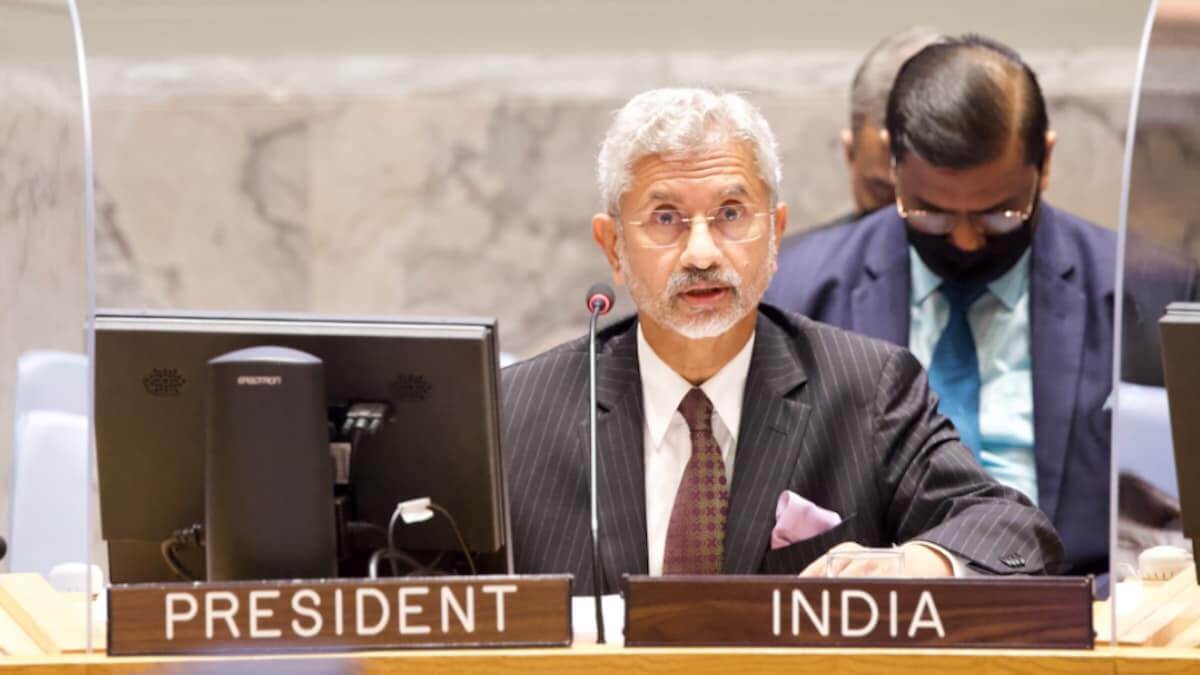On Thursday, India chaired the United Nations Security Council (UNSC) meeting concerning “threats to international peace and security caused by terrorist acts.”
Addressing the virtual meeting, Indian External Affairs Minister S. Jaishankar spoke of the rising threat posed by terrorism, the conflict in Afghanistan, and the dangers posed by states that provide sanctuaries for flourishing terrorist activities.
Jaishankar said the Taliban’s takeover in Afghanistan has “naturally enhanced global concerns about their implications for both regional and international security.” He reassured that India would continue to support the Afghan people, but it was too early to comment on the Taliban’s leadership. However, he clarified that, for now, the focus would remain on “Indian nationals in Afghanistan.”
He also warned of the “heightened activities of the proscribed Haqqani network” and highlighted that this presents a threat “to international peace and security.” In addition, Jaishankar spoke of the changing nature of terrorism and the new and varied dangers it poses. He said, “In spite of the progress we have made to tighten the legal, security, financing, and other frameworks to combat terrorism, terrorists are constantly finding newer ways of motivating, resourcing, and executing acts of terror.”
The Council also looked at the 13th report of the Secretary-General on threats posed by the Islamic State of Iraq and the Levant (ISIL). The report, submitted on August 3, warned about the expansion of the ISIL-Khorasan, an arm of the ISIL, in Afghanistan, specifically near Kabul. In this regard, Jaishankar warned about the ISIL-K’s plan to disturb the peace and security of India, which is in Afghanistan’s “immediate neighbourhood.”
Discussing the threats posed by the ISIL, Jaishankar said the group had begun working through its affiliates across the globe while keeping its core focus on Syria and Iraq. He said, “This evolving phenomenon is extremely dangerous and poses a new set of challenges to our collective efforts in our fight against ISIL and terrorism.”
Therefore, he recommended the UNSC should take a stand that is not “selective, tactical, or complacent” of the issues. Jaishankar said that actions must be taken against countries providing “sanctuaries for terrorists,” who are responsible for “raising resources” for such groups. He highlighted that “state hospitality” to such terrorists must be called out. In this regard, he warned that certain countries continue to “undermine and subvert” the international community’s efforts to combat international terrorism.
These comments were a veiled jab at Pakistan, which has been under the scanner of several international organisations, including the Financial Action Task Force (FATF), for its inability to curb terror funding and money laundering on its soil. Pakistan is also an old ally of the Taliban. Moreover, India has often warned of Pakistan’s state-sponsored terrorism.
Furthermore, in a concealed attack on China, Jaishankar urged countries not to make “blocks and holds” on requests submitted to designate individuals as UN-sanctioned terrorists. It hinted at China’s repetitive use of its veto power in the UNSC to block the requests made by India and other countries to label Jaish-e-Mohammed leader Masoor Azhar as a global terrorist.
Jaishankar’s statements come at a crucial time when India has been holding back from taking a stand on its engagement with Afghanistan since the Taliban takeover. India has previously supported elected governments in the war-torn country, including that led by former President Ashraf Ghani. However, its position following the Taliban taking control of a majority of Afghan provinces remains unclear.
Indian EAM Jaishankar Takes Veiled Jab at Pakistan at UNSC Meet
While chairing a UNSC session, Indian External Affairs Minister S. Jaishankar condemned countries that provide “sanctuaries for terrorists,” which was viewed as a veiled jab at Pakistan.
August 20, 2021

SOURCE: TWITTER
